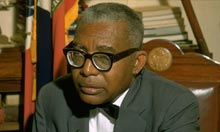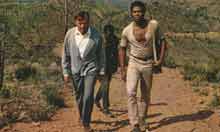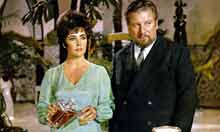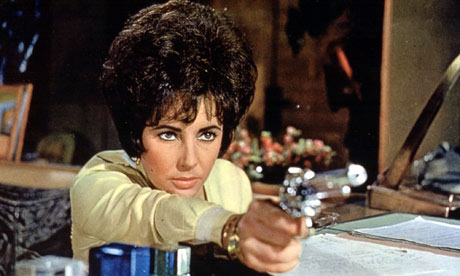Director: Peter Glenville
Entertainment grade: C+
History grade: A–
-
The Comedians
-
Production year: 1967
-
Country: Rest of the world
-
Cert (UK): 18
-
Runtime: 130 mins
-
Directors: Peter Glenville
-
Cast: Alec Guinness, Elizabeth Taylor, Lilian Gish, Peter Ustinov, Richard Burton
"Papa Doc" Duvalier in 1963 
François "Papa Doc" Duvalier was elected president of Haiti in 1957. His unrestrained brutality and embezzlement, combined with a personality cult based around Haiti's folk religion, Voodoo, made him one of the most notorious dictators of his time. Novelist and screenwriter Graham Greene based The Comedians on his experiences in Duvalier's Haiti.
Politics
"I've worked in south Wales you know." 
Mr Brown (Richard Burton) arrives back in Haiti after failing to sell his Port-au-Prince hotel. For this production, Port-au-Prince was recreated in Dahomey, now Benin. Most Haitians are descended from slaves transported from that part of west Africa: there are similarities of culture, religion and, sadly, underdevelopment. "I've worked in many worse places," said Burton cheerfully in the making-of documentary. "Like the Sahara desert, and south Wales."
Taylor-made 
Filming in Haiti was not an option. Duvalier, still very much in power, banned Greene's novel and this Hollywood adaptation. He also published a booklet called Graham Greene Démasqué – Finally Exposed, describing the novelist as "A liar, a cretin, a stool-pigeon … unbalanced, sadistic, perverted … the shame of proud and noble England … a spy … a drug addict … a torturer." "The last epithet has always a little puzzled me," Greene remarked, apparently happy to cop to the rest. "The Comedians, I am glad to say, touched him on the raw."
Violence
Give me your organs 
Though The Comedians is fictionalised, its set-pieces are based on real events. Among these is the funeral of Monsieur Philipot, the minister for social welfare, who is found dead in Brown's hotel pool. The hearse containing his body is ambushed by Duvalier's militia, the Tontons Macoutes. They break the windows of the car, lift out the coffin and drive off with it, ignoring Philipot's screaming widow (played briefly but memorably by Gloria Foster, better known as the Oracle from The Matrix). In real life, there was an almost identical scene at the 1959 funeral of Clément Jumelle, one of Duvalier's political opponents, complete with Tontons Macoutes publicly stealing the coffin out of a hearse and a screaming widow. Duvalier was said to have wanted Jumelle's body to use his organs in a Voodoo ritual. Whether or not rumours like this were true, they created a climate of fear which increased Duvalier's power. Jumelle's family had ensured that the organs were removed from the corpse before it was placed in the coffin.
More violence
Hiding from Papa Doc or Liz? 
A well-meaning American couple (played splendidly by Paul Ford and Lilian Gish) follow a line of schoolchildren heading for a ceremony. They end up in the graveyard, where the children are being forced to watch a firing squad execute prisoners lashed to wooden stakes. In real life, an anti-Duvalier coup had been attempted in 1964 by a 13-man guerrilla group called Young Haiti – which has an echo in the rebellion led by Philipot's nephew Henri in the movie. After a lengthy hunt, Duvalier's forces captured the last two men of Young Haiti, Louis Drouin and Marcel Numa, and took them to the cemetery in Port-au-Prince. Hundreds of children were bussed in to watch them tied to wooden stakes and shot. As in the movie, the execution was filmed. Duvalier ordered that it be repeatedly broadcast on television and in the cinemas.
Romance
Sod history, let's snog 
Because it has Elizabeth Taylor starring alongside Richard Burton, the movie makes a big hoo-ha of the tangled extramarital love story from Greene's novel. If it wasn't quite so hung up on self-immersed white expats having sex when they shouldn't, it could have done a lot more with its Haitian characters, including Captain Concasseur (Raymond St Jacques), the suave, cruel Tonton Macoute; Dr Magiot (James Earl Jones), the urbane Marxist doctor; and Henri Philipot (Georg Stanford Brown), the brave young painter hoping to start a revolution. All these characters have real-life parallels. The Haitian reality of the 1960s is so extraordinary that the truth is not only stranger than fiction, but much more interesting.
Verdict
My hair is definitely bigger than yours 
The Comedians would have to lose about half an hour of dysfunctional romance to be a really great drama, though it has moments of brilliance. As an evocation of 1960s Haiti, though, it is impressively accurate.
• Red Heat: Conspiracy, Murder and the Cold War in the Caribbean by Alex von Tunzelmann is published now by Simon & Schuster.

